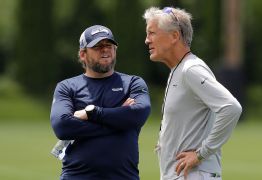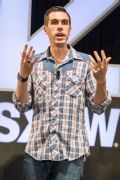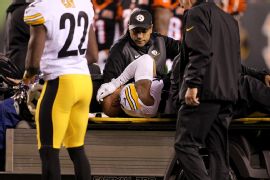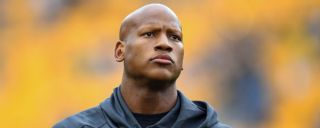|
"Waste no more time arguing what a good man should do. Be one." -- Marcus Aurelius, "Meditations" Here is Ryan Holiday, alone in his off-campus apartment at UC Riverside, a decade before he writes a book that Tom Brady poses with next to his Super Bowl-winning football and Rory McIlroy credits with helping him maintain his No. 1 ranking on the PGA Tour. Here is Ryan Holiday before all of that, a gangly 19-year-old sophomore sitting at his kitchen table in 2006 and reading a book that fundamentally alters his life: Marcus Aurelius' "Meditations." "How did no one tell me about this?" he thinks. Aurelius, the second-century Roman emperor, practiced a philosophy called Stoicism that argues individuals shape their destinies by controlling what they can and letting go of what they cannot. The Stoics believe the essence of life is how we choose to respond to the things that happen to us. "Choose not to be harmed and you won't feel harmed," Aurelius writes. Holiday writes it down. He copies dozens of passages and tapes them to his apartment walls. "The impediment to action advances action." "What stands in the way becomes the way." He reads other Stoics: Epictetus, whom Aurelius loved, and Seneca the Younger, an ancient Roman senator. Holiday practices Stoicism, even after he drops out of UC Riverside to work at a Hollywood talent agency, even after he moves on to American Apparel, where he becomes the director of marketing before he can legally drink. At home he pursues the Stoic tenets of discipline and humility, reading books on philosophy, science and history. He tracks the insights from these books on 4-by-6-inch notecards that fill multiple boxes and become Holiday's own card-catalog system. At work, his voracious curiosity and consuming ambition fuel risqué American Apparel campaigns that give the company, and Holiday himself, a bad-boy reputation. He serves as American Apparel's spokesperson when former employees file sexual harassment suits against the company. He consults for celebrities like Tucker Max, the author of "I Hope They Serve Beer in Hell." He loses his bearings. His reading tells him: He has a choice to make. He can be the man he is or, as Aurelius writes, the man he should be. He quits his job. He writes a self-immolating memoir about the Wild West of digital marketing, "Trust Me: I'm Lying," which shocks everyone and becomes a bestseller. He moves from New Orleans to New York to a farm outside Austin, Texas, and along the way tells his publisher his follow-up will not be scandalous. It won't even be a business book. It'll be about Stoicism. It'll show how Stoic thinking can improve modern lives. His publisher says the book won't sell well, but Holiday believes he's far from the only person who yearns for ancient wisdom. He takes the book's title from a phrase on a Post-it note on the Riverside kitchen wall: "The Obstacle Is The Way."
 The GM's Burning Questions "Associate with people who are likely to improve you." -- Seneca Here is John Schneider, the youngish general manager of the Seattle Seahawks, during a pro day workout for the Oregon Ducks' Marcus Mariota, in spring 2015. Schneider talks with Mike Lombardi, a 30-year front-office executive who spent the previous season with the New England Patriots. Bill Belichick's Patriots. The Patriots who snatched the Super Bowl away from Schneider's Seahawks weeks earlier. As Mariota throws, Schneider peppers Lombardi with questions about Belichick -- how he approaches the game, how he leads, how he handles setbacks and level-sets after triumphs. Lombardi holds up his hand. Hang on. He tells Schneider about a book that came out the previous year, one he has recommended to the Patriots' staff. The principles of the famous "Patriot Way" are distilled within it. If Schneider wants to know more about Belichick, wants to get the "vibe for what he's like and what his philosophy is and how he approaches life and football," Lombardi says -- if he wants to more fully understand the difference between winning and losing on the 1-yard line in the Super Bowl, he needs to read it too. What's it called? "The Obstacle Is the Way," Lombardi says. Schneider loves it. He later tells ESPN that the principles of Stoicism -- resilience and objectivity, the push to accept what you cannot control and adapt to what you can -- this is what he and Seahawks head coach Pete Carroll have been preaching as well. Schneider gives the book to Carroll and the rest of the Seahawks' staff. Soon, word gets out: The two best teams in the league are reading the same book. Soon everyone else in the NFL is too.
 The Trail Blazer and What Comes After Happily Ever After "It does not matter what you bear, but how you bear it." -- Seneca Here is CJ McCollum, in a bath of ice water in the Portland Trail Blazers' training room one night in 2017, paging through "Outliers," by Malcolm Gladwell. The star shooting guard reads here to "clear my mind," he says. Tonight, Portland center Festus Ezeli passes by the cold tub. When you're done with that book, he says, I've got another for you: "The Obstacle Is the Way." By the time McCollum gets to "Obstacle," the book has sold hundreds of thousands of copies and been translated into 19 languages. He can see why. He likes the way it's structured around historical figures who exemplify Stoicism. There is the story of collapsing oil markets in the 1800s and a young John D. Rockefeller who saw the panic as a chance to learn from mistakes. There is the story of Rubin "Hurricane" Carter, a boxer falsely imprisoned for murder who spends his sentence reading law books and writing legal briefs and is eventually released. There is the story of Amelia Earhart, who endures sexist taunts from male pilots without surrendering her dream to do what they could not: solo the Atlantic. "I needed something like this," McCollum tells Ezeli. Outwardly, McCollum's life is fine: a good player on a great team who just signed a life-altering contract: a $106 million extension. "Generational wealth," McCollum says. An unreachable dream obtained. And yet that contract comes with new pressures to perform and unsolicited pings from charities and friends and strangers. "Phone constantly blowing up," he says. How to balance his conscience, his goals away from the hardwood, against the bleary-eyed grind of the 82-game season? "Understanding what certain people went through to get to where they're at ... I think all that stuff helped me see my life," McCollum says. "See some of the obstacles and things that I was facing, not just in basketball but time management, relationships, opponents. How do you respond? How do you react? Do you allow it to affect you at home? Do you allow it to affect how you treat others? "That sense of Stoicism really kind of resonated with me to where I was like, Wow, this is something I can practice. I can practice steadiness. I can practice accepting things I cannot change. I can practice a certain calmness, a certain coolness, an understanding of how to really just be content with what I have. Understanding that there are certain things that I may yearn for but it may not be great for me. Understanding that certain failures are going to help shape me and make me into a better person to where I won't be afraid of those failures." McCollum gives the book to friends, his family and his trainer. He invites Holiday to a Blazers game in San Antonio. Afterward they discuss everything but basketball. Each man is a success -- McCollum a great basketball player, earning millions from it, and Holiday a bestselling author and personal growth guru -- but they know any emblem of success misses the point. The point is to pursue fulfilling work, regardless of its reward. They become friends.
 The Coach and the Metamorphosis "It is impossible for a man to learn what he thinks he already knows." --Epictetus Here is Nick Saban, in the front row of an auditorium on the grounds of the University of Alabama football complex. It's August 2016, and he watches as Ryan Holiday paces the stage talking about humility to a roomful of players who won the national championship months earlier. Holiday preaches the "beginner's mindset ... staying the student in everything you do." He tells the story of Kirk Hammett, an amazing guitar player who landed his dream job with Metallica but didn't trust his musical technique. Hammett sought out hard-assed virtuoso Joe Satriani to drill him, and every week for a year, even as he toured the world and recorded in studios, even as his fame grew, Hammett ran through Satriani's merciless lesson plans. This, Holiday tells the confident Crimson Tide, was how Kirk Hammett became, well, Kirk Hammett. "This ties in to a quote from Epictetus, who's a Stoic philosopher," Holiday says. "He's saying it's impossible for a person to begin to learn what he thinks he already knows." When Holiday wraps up, the first question comes from the shadows of the dimmed auditorium. It's Saban, then a five-time national champion, hungry for more. ***There's an Alabama coach who doesn't attend Holiday's speech that day: Lane Kiffin. The coach whose self-promotion and "screw it, let 'em fire me" attitude has infuriated Oakland Raiders owner Al Davis, the USC athletic department and the entire state of Tennessee misses the "stay-the-student" lecture. Afterward, Ed Marynowitz, Alabama's associate athletics director for football, chases Kiffin down and puts a copy of Holiday's latest book, "Ego Is the Enemy," in his hands. "Read it," he says. Kiffin prepares for the upcoming season instead. Saban praises him for blowing life into Bama's offense, but over the course of the fall, Saban's sideline ream-outs of Kiffin become the stuff of in-game replays and internet memes. Rumors of Kiffin Fatigue extend through the season. The rumors burst into the open in December, when Kiffin takes a head-coaching job at Florida Atlantic University weeks before Alabama's appearance in the 2017 College Football Playoff. He promises Saban he'll focus on winning a championship before he leaves, but Saban effectively fires him one week before Alabama takes on Clemson in the national championship game. When the Tide lose to Clemson, a wounded Kiffin tells The Washington Post that Alabama would have won had he been there. Power 5 programs see his job at FAU -- amid the wilds of Boca Raton and Conference USA -- as the exile Kiffin deserves. Kiffin sees things differently. He says he has a new outlook inspired by a book he read halfway through the 2016 season, Holiday's book "Ego Is the Enemy," the copy he got from Marynowitz. He read that, he says, and then "The Obstacle Is The Way" too. They helped him reexamine everything. He saw connections to his own habit of pacing his career off the markers of success: "I used to say all the time, 'I want to be the youngest head coach, the youngest to make X millions of dollars,'" he recalls. "I can see where my ego got in my way." For years it burned him that he was fired from USC on the tarmac of an airport in the middle of a season. The words of the Stoics showed him how his embarrassment, his existential crisis -- Where will I go from here? -- could lead to maturation. "It wasn't until I read 'The Obstacle Is The Way' that I said, 'OK, that obstacle of getting fired -- if that didn't happen, I wouldn't have ever come to Alabama and I wouldn't have gotten better and I wouldn't have had that experience of learning from [Saban]," Kiffin says. The job at FAU, then, isn't the manifestation of ego at all cost. It's Kiffin applying the lessons of Stoicism. It's turning down $2 million a year to be LSU's offensive coordinator and having the humility to be FAU's head coach for half of that. "In fact less than half," Kiffin says. It's being accountable for his actions. The quotes in the Post? He was blaming himself for the loss. "You could have made a difference," he says. In his first season at FAU, Kiffin tells his staff he wants to meet one-on-one with players going through personal struggles. "Send them to me," he says. He talks with his team about winning games but also says, "If that's truly the only thing, you won't be very happy. I've lived it." FAU goes 11-3 in Kiffin's first year and wins the Conference USA title. Within three years, he is back in the Power 5, the head coach at Ole Miss. These days, he sends signed copies of "Ego Is the Enemy" to coaches who act like he once did. "Let them see the great coach you are, not the ego," one note reads.
 The Steeler's Impossible Dream "The impediment to action advances action. What stands in the way becomes the way." -- Marcus Aurelius, "Meditations" Here is Ryan Shazier, one day during those hazy months of his hospitalization, after a hit against the Cincinnati Bengals that left him motionless on the field, after doctors told him he had a 20% chance of walking again, after he told his fiancée, I understand if you don't want to care for me, and after she stayed by him, after spine stabilization surgery and even after rehab sessions began at the University of Pittsburgh Medical Center. On one of those days when he still can't feel anything beneath his waist, here is Ryan Shazier, staring at unadorned hospital walls and turning now toward a knock at the door. In steps Thomas Tull, part-owner of the Pittsburgh Steelers. Tull thinks of Shazier as not just Pittsburgh's All-Pro linebacker but a friend, and he carries a book with him. "Especially with what you're going through right now," Tull says, pulling up a chair next to Shazier, "I thought this would be a good book to read." "The Obstacle Is The Way." Shazier has never heard of it, but as he reads, he finds that Stoicism reminds him of the life he led before the pain and depression of these months in the hospital. If he is to live again, and live well, he has a choice to make, like the book's author before him: Be the man he is, or the man he should be. Live by doctors' pitied prognoses or by a life of his making. To be a professional athlete is to believe nothing is impossible, to know that an obstacle in your path can give you the strength to remove it. Holiday's book affirms what Shazier the football player has long believed and so much of what his Christian faith has taught him. "I can do all things through Christ who strengthens me." -- Philippians 4:13. In February 2018, two months after he ruptures his spine tackling the Bengals' Josh Malone on a crossing route, he writes to Holiday. "It's an honor to talk to you," he says. "The book is helping me deal with situations with a better mindset." Holiday reads the email from his home office in Austin. In the six years since its release, "Obstacle" has sold around 700,000 copies and put him in the "surreal" position of fielding questions from Fortune 500 CEOs and having presidential candidates subscribe to his newsletter. Shazier's message, though, cuts through, shakes him. "To hear that Ryan had even taken the time to read the book" humbles him, he says. Holiday sends Shazier a note saying how grateful he is for the linebacker's words. That leads to more emails and text messages and ultimately a phone call, in which Shazier feels comfortable sharing a dream inspired in part by "The Obstacle Is The Way." He wants to play professional football again. First, after almost eight weeks of grueling physical therapy, Shazier rises under his own power. That same February, he poses with teammate Ben Roethlisberger on Instagram, his arms draped around the QB's shoulders, huge smiles on both their faces. That April, four months after he heard he had a 20% chance of walking again, he strides -- stiffly, and with the assistance of his fiancée, Michelle Rodriguez, but walking all the same -- onstage at the NFL draft in Dallas. The crowd gives him a standing ovation as Shazier announces the Steelers' first-round pick. On the first anniversary of his injury, he posts a video of himself from a weight room, where, under the supervision of a physical therapist, he performs the most arduous of lower-back exercises, the deadlift. In another video, he is running on the beach and shuffling through agility drills. "I cried when you left the field, Ryan," one commenter writes after the beach video posts, "and I'll cry when you return." The Steelers begin to think Shazier's obstacle might become his way back to the NFL. They toll Shazier's contract before the 2019 season, meaning he will make the league minimum but stay on the roster. Shazier does not play in 2019, but Steelers GM Kevin Colbert tells reporters that there is "no ceiling" with Ryan Shazier. ***  Yet life is not positive thinking or rah-rah quotes or even a book about Stoic resilience. Life is difficult. Sometimes the obstacle in the path does not move. Despite Shazier's remarkable progress, it is no small thing to return from spine-stabilization surgery. A full recovery can take years, and the National Institutes of Health advise against returning to a game as violent as professional football. The longer Shazier is out of the NFL, the harder it'll be to make it back. Elite pros in their prime average three years in the league. Every season the 27-year-old is away from the field makes his return to it that much more of a distant hope. The Steelers reluctantly acknowledge this in March, when they place Shazier on the reserve/retired list: Shazier is effectively, contractually, no longer a professional athlete. "I'm upset by the situation I'm in," he says a few days later. He had chosen the inner storm of the past three years. He chose to ignore doctors' projections about a limited life. He chose to follow the impossible dream, which means he chose a grueling physical therapy that left his body soaked in sweat and contorting in pain. He chose to exhaust himself again at night too, when he wrestled with self-doubt about what all this effort would bring. Then he chose to give that same all-out effort the next day. He did that for years. And it won't be enough. "That's hard," he says. But he knows that pain and frustration has brought him to another choice. He can ruminate on his current predicament, or he can see it as the next obstacle on his path and find a way to overcome it. "There's actually good in every situation and you just have to figure out what it is," he says, sounding every bit the Stoic. "The book made me think how to think about change." In the past year, Shazier has started a foundation, Shalieve Fight, which raises money to support outpatient care for people recovering from spinal cord injuries, so others can have access to the rehabilitation equipment and expertise Shazier did. He's enrolled in the University of Pittsburgh, looking to complete the undergraduate degree he started at Ohio State in 2014. He plans to get his master's in business administration. He has invested and become a partner in a Pittsburgh-area fitness center that joined with others to give money to fight the recent wildfires in Australia. He has started a web series called "50 Phenoms," in partnership with the University of Pittsburgh Medical Center, in which he interviews people who've overcome daunting medical setbacks. He still wants to play football and is working toward it, but if it doesn't happen, he can play with his two kids. He danced with Rodriguez at their wedding last year. "I remember just being so happy in that moment," he says. "[So] grateful." Thinking about how far he's come, Shazier is -- there's no other way to say it -- philosophical: "Hey, this obstacle -- it's not what you expected ... but one of my ultimate goals is to bring more joy, help people be their better selves." These days, he and Holiday talk about a book he might write.
|

